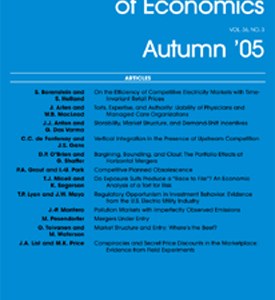
Leuven, E., Oosterbeek, H., Sloof, R. and Sonnemans, J. (2003). An experimental comparison of reliance levels under alternative breach remedies RAND Journal of Economics, 34(2):205--222.
-
Affiliated authors
-
Publication year2003
-
JournalRAND Journal of Economics
Breach remedies serve an important role in protecting relationship-specific investments. Theory predicts that some common remedies protect too well and induce overinvestment because of complete insurance against potential separation, and the possibility to prevent breach by increasing the damage payment due through the investment made. In this paper we report on an experiment designed to address whether these two motives show up in practice. In line with theoretical predictions we find that overinvestment does not occur under liquidated damages. In case of expectation damages the full insurance motive indeed appears to be operative. In case of reliance damages both motives are at work, as is predicted.